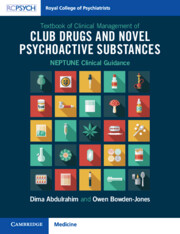 Textbook of Clinical Management of Club Drugs and Novel Psychoactive Substances
Textbook of Clinical Management of Club Drugs and Novel Psychoactive Substances from Part III - Drugs with Primarily Stimulant Effects
Published online by Cambridge University Press: 06 October 2022
Amphetamine-type stimulants (ATS) are world-wide the second most popular group of drugs after cannabis (UNODC, 2019)23 and a significant proportion of NPS with stimulant effects are ATS.
The World Health Organization (WHO) defines amphetamine-type stimulants (ATS) as a group of drugs whose principal members include amphetamine and methamphetamine. A range of other substances also fall into this group, such as methcathinone, ephedrine, pseudoephedrine, methylphenidate and 3,4-methylenedioxy-methamphetamine(MDMA).
Globally, seizures of ATS increased sharply from the second half of the 1990s until 2001 and over the period 2009–2017.24 The largest number of seizures in the past few years have been methamphetamine, followed by amphetamine, ‘ecstasy’ type substances, other stimulants (MDPV, methcathinone, methylone, several other cathinones, dimethoxyamphetamine and several piperazines) and prescription stimulants.
To save this book to your Kindle, first ensure no-reply@cambridge.org is added to your Approved Personal Document E-mail List under your Personal Document Settings on the Manage Your Content and Devices page of your Amazon account. Then enter the ‘name’ part of your Kindle email address below. Find out more about saving to your Kindle.
Note you can select to save to either the @free.kindle.com or @kindle.com variations. ‘@free.kindle.com’ emails are free but can only be saved to your device when it is connected to wi-fi. ‘@kindle.com’ emails can be delivered even when you are not connected to wi-fi, but note that service fees apply.
Find out more about the Kindle Personal Document Service.
To save content items to your account, please confirm that you agree to abide by our usage policies. If this is the first time you use this feature, you will be asked to authorise Cambridge Core to connect with your account. Find out more about saving content to Dropbox.
To save content items to your account, please confirm that you agree to abide by our usage policies. If this is the first time you use this feature, you will be asked to authorise Cambridge Core to connect with your account. Find out more about saving content to Google Drive.